#if not the condonation of a patron saint
Note
You know, it wouldn't even occur to me that certain ships might even exist... if authors of fanart like yours (even before your dragonball phase) didn't insist on bringing that fact to my attention by screaming murder at anyone who might dare interpret their stuff in a certain way. And it's exactly that disclaimer that causes me to look closer at the art in question and realize that... oh wow, right, Gohan is really acting like a jealous lover here, huh? Assuming he must be the One Person (1/3)
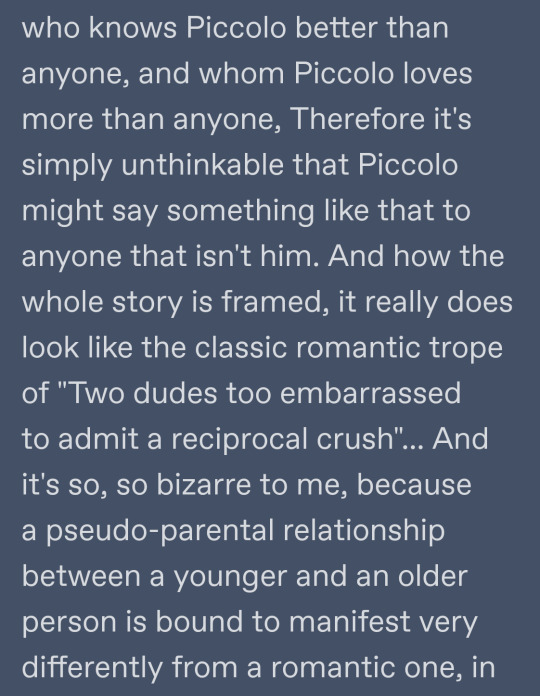


My condolences about your daddy issues or whatever, but you're the one that's reading weirdly deep into this, dude. I genuinely don't know what kind of 'gotcha' you think you wrote but... damn.
Is this your first day on the internet? People tag and draw blatantly-platonic seeming art that's actually ship art upon closer investigation constantly. Now idc what people do as long as its properly tagged, but it's a different story when my art is involved. Of course my DNIs are to prevent "misunderstandings." I'm not a moron; anyone can pick out supporting evidence for their bias if they look for it, which is exactly the point of saying I don't condone it. It's me going "Hey, these are my boundaries! If you don't respect them, that's shitty of you!"
I can't control how people interpret my art. I know this—but I can sure as hell clear the air about my intent and opinions. So I'll make myself very clear: I don't like my content being seen in a romantic context. Unless I confirm otherwise, it's platonic. Why? Because I fucking say so. If word of god isn't reason enough, that's on you. Your inability to see emotional intimacy between two adults as anything but romantic is not my fault—nor is it my responsibility to overcorrect.
It may shock you that, yes, this is how many families do interact. Not everyone's idea of a "convincingly portrayed" family dynamic is going to be the same. I'm a very sappy person irl and so is my family. It's honestly kind of pathetic that you obviously think my content is too much for a paternal relationship.
Even aside from that though, your arguments are just bad. I mean did you even reread this before you sent it? Sure. "Gohan acts like a jealous lover..." of his preschool-age daughter. Yeah, that's a totally normal take. Really makes you seem like a well-adjusted individual. I don't even know where you got the jealousy thing from since he spends the whole comic actively trying to leave and stop Pan from sticking up for him. Your other points are just conspiratorial; I see no point addressing them.
So yeah, take your final proposition and shove it. Maybe focus on how to "effectively and convincingly portray" whatever content measures up to your standards instead of preaching to me like I shouldn't do the same. I don't owe you jack—especially when you're too much of a coward to talk down to me while hiding behind anon.
And if this is who I think it is (given the timeframe you let slip), get off of that damn high horse already. You're not the patron saint of correct characterization, and your unwarranted criticism doesn't make you look smart. It makes you look like an entitled tool who can't resist hearing your own voice. Quit tearing people's hobby work down because you can't find enough fan content to satisfy your own standards.
I love found family. I love sickeningly sweet """unconvincing""" found family, and if you think that's trite, ooc, or—I guess, romantic—keep it to yourself. You're not going to 'con'crit me out of creating exactly what makes me happy, and this weird victim-blamey diatribe sure as hell isn't either. If anything, you've only convinced me to keep using DNIs.
#cannot believe i spent that many words answering this. originally i wasn't even going to#but then i reread it and it was just so fascinatingly dogshit that i couldnt help it#ask#dbz#skit yells
65 notes
·
View notes
Text
"The Librarians and the Christmas Thief":
Obviously starting off strong because the title includes two of my favorite Librarians things—Christmas and thief!
But also I have been staring at that thumbnail since I started the season because what is Eve wearing.
...Is this Hogfather: Librarians Edition
Eve: "I don't WANT to go on vacation, that means LEAVING HOME!" Mom Instincts kicking in again.
Wait.
EZEKIEL BACKSTORY?
I. I would like more detail on how Ezekiel became part of this cartoonishly thievish Artful Dodger Family. Is this his birth mother?? Super unclear.
Buuuuut no time for that because we are having a Clyde Langer "Mark of the Beserker" moment and he's breaking all the secrets just to impress his family. This won't end well.
(Also yes, Ezekiel, you are absolutely out of their criminal league. We all know that. It's okay.)
Child, you are going to regret this so much, so soon.
Yyyep. Talked himself back into sanity in like thirty seconds.
"The Patron Saint of Thieves. Like Santa's bad brother." Jacob that is VERY OBVIOUSLY an icon of St. Nicholas of Myrna. And "patron saint of thieves" does not mean someone who CONDONES stealing, it's a perfectly normal patronage!!
This is... it's throwing me off a little. This is fantastical, to a degree that usually explicitly involves magic in this universe, but it's supposed to be part of Ezekiel's "non-Library" life. It's disconcerting.
The LIQUIDATION WEAPON is BLATANTLY sci-fi or fantasy. Really? Ezekiel grew up in this comic-book thievery??
Shelving that, for now.
Hey! Ezekiel got to do a laser-dance! :D
"I took you in off the streets" okay I was ASSUMING that was the deal but it's nice to get confirmation. But now I'm sad about homeless baby thief Ezekiel. :(
I know this episode is following the "shenanigans the kids get up to while Mom's on vacation" format, but also. EVE COME GET YOUR BOY.
...Ezekiel has literally always been a Robin Hood.
OKAY. SURE.
I guess he WOULD. Because he likes stealing but he doesn't care about money. FINE. And he's NEVER TOLD ANYONE.
This is FANFIC-LEVEL "secret heart of gold" backstory. I feel so validated.
However, turns out somebody was holding back some secrets in What Lies Beneath the Stones, huh.
I will be... weaving this whole episode into Ezekiel Thoughts, going forward. Seeing how it goes.
12 notes
·
View notes
Text


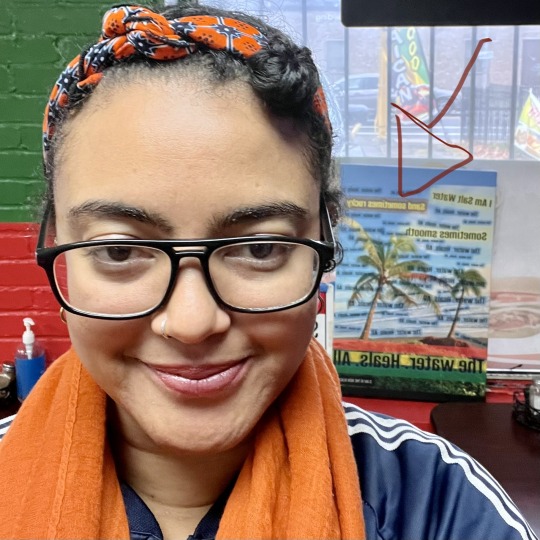
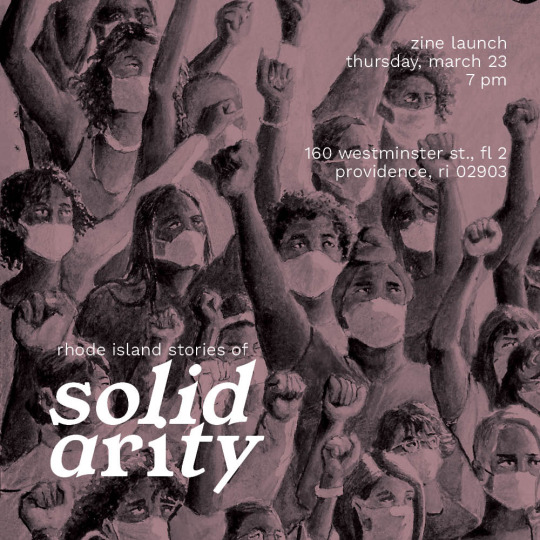
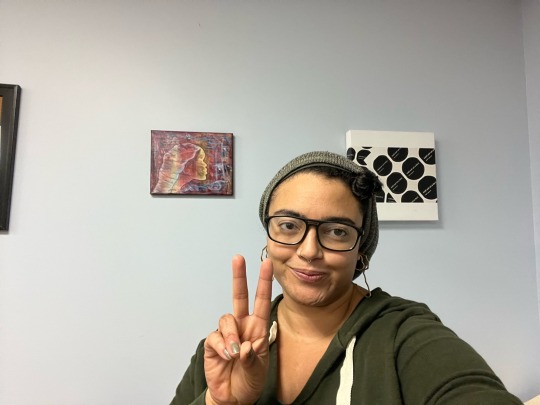



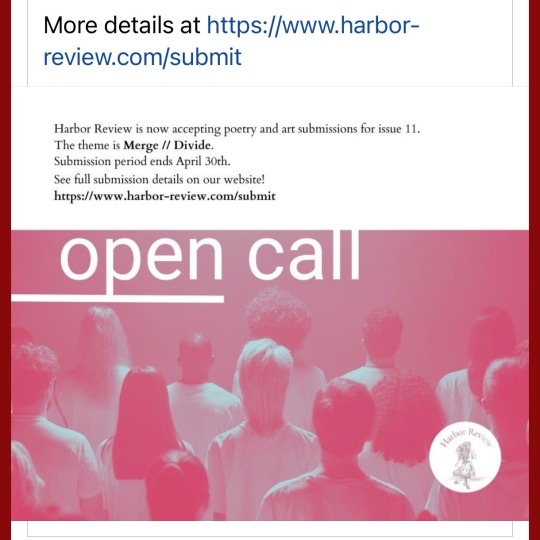

Take 5 w. Reza Rites
The #AmbitiousBlackFeminist
And 3 AM IS THE NEW BLACK
Below are five things on my mind for today’s edition of Take 5 with Reza Rites. What are five things you’re thinking about?
My uncle, Jay Clifton, passed away last month; I want to thank everyone who checked in and shared condolences. His life was characterized by love for family, professional globetrotting, and service to country, including through time in the Air Force and in his work with the State Department. He balanced being a man who joked quickly and cared warmly, with being a man of mystery and patron saint of confidentiality. I never could describe what he did - even after visiting him in Haiti during a Thanksgiving break while I was in high school. But there was no doubt he loved me and his/our family fiercely. He will be missed by many, including me.
On a parallel timeframe, that is also, perhaps, a perpendicular political positionality, I received news that three poems I submitted for consideration were selected by the What Cheer Writer’s Club, for “Solidarity,” their forthcoming anthology. One of my poems, in particular, offers a critique of “the military industrial complex” and the destruction caused by the weaponry and belief system that condones heinous acts of violence perpetuated all across the world.
Despite what appears to be a contradiction between the love, admiration and adoration that I feel (felt?) for my uncle, and my political and philosophical beliefs about war, I think there are two basic truths demonstrated here that are worth noting in the wake of Black History Month: a) many families can and do stay faithful to love, and to co-existing in the gray areas of mixed and sometimes unaligned personal beliefs and principles. Black women are the original authors of plurality and inclusion; and b) Black American history, and the domestic struggle for freedom, self-determination, and access to opportunity and autonomy has always seen multiple iterations, directions, attempts, and victories, and it has often included a global awareness and intentional integration of Black Freedom Struggles abroad. This is true in my family, as well.
I keep seeing cool opportunities for creative writers. While I figure out what I can and cannot do (now), I am going to try to share more of these announcements* on my 3 AM IS THE NEW BLACK pages.
My first mentor-instructor meeting went well. During one exercise, he asked me about my poetry and invited me to say anything I wanted about it. Along with a series of now-forgotten utterances, I briefly mentioned being inspired by Rumi and Pablo Neruda. Then he asked me to read some of the poems I had submitted (that he had selected), and after I finished reading each one, he followed up by reading the same one that I had just done. It is hard to explain the impact, but the experience was affirming and reverberative. He also asked me to send additional writing samples, audio poems, video presentations, and other creative works - a request that showed that rather than cower in fear when offered a glimpse of my full portfolio of work, he was ready for the ride. Beep beep.
Sunshine and laughter, Reza Rites
*announcements are neither endorsements nor markers of affiliation.
#3amblack #wear3amblack #shop3amblack #rezarites #ambitiousblackfeminist #poetry #art #blackownedbusiness #blackbusinesses #blackwomanowned #blackwomanownedbusiness #buyfromblackwomen #blackgirlmagic #blackwriters #blackwomenwriters #blackpoets #blackwomanpoets #blackartists #blackartmovement #blackwritersofinstagram #blackpoetsofinstagram #blackartistsoninstagra #blackentrepreneurs #onlineshop #collageart #writingwhileblack
#carefreeblackgirl #digitalart #askmeaboutit
0 notes
Text
sanc·ti ·fi ·ca ·tion
1. the action of causing something to be or seem morally right or acceptable.
"the sanctification of violence"
“the sanctification of the gratitude of the dying”
“the sanctification at the hand of a saint”
2. the action of making or declaring something holy.
"the sanctification of girl and soldier into miracle and saint, of girl into blade"
“the sanctification of her divine mission—a girl more spider than girl, more earnest than heretic, more faithful than any priest”
“the sanctification of the knife”
3. the action or process of being freed from sin or purified.
"the sanctification of saint back into girl back into body back into dust”
“the sanctification of a blessed, righteous death”
“the sanctification one girl gifts another when she gives her a knife”
#knifeposting#she gives you a knife#alinej#I LOVE watching knifepostinng so much like this shit is my jam#volume to 11 plz and thanks#what is sanctification if not the process of sainthood#if not the condonation of a patron saint#if not the metamorphosis into eveything clean and sharp and righteous and holy and ablaze#what is sanctification if not the transformation into something horrible beautiful holy and necessary#grishaverse#god gives you a knife and you thank her for it
66 notes
·
View notes
Note
Hot take: Sally Rooney is the Emperor's New Clothes of authors and no one actually likes yer books but feels they can't say otherwise // Scalding hot take #2: Sally Rooney's characters are the patron saints of passivity and us type A folks or those who don't let ourselves get trampled over 'for the sake of love' absolutely cannot comprehend or condone their behaviour 🤷🏼♀️🚨
I actually don't think I can emphasize enough how much I dislike Sally Rooney's books but these hot takes come pretty close. :)
9 notes
·
View notes
Note
I take it that the kind of villains that torture and murder children are more up your alley then huh
Not even sure what this was in response to, but it's a pretty timeless quote nonetheless. This right here sums up basically everything that a lot of my anons have to say about Rakepick, and my thoughts on her. Or, to be more accurate, any mention I make of her. Referencing her existence and wanting her to be written well is not the same thing as liking her personally and condoning her actions. Come on, guys. Patricia Rakepick is an existent character in this game, a prominent one, even...and some of you need to make peace with that.
Anyway, the characters who are more up my alley are people like Merula and Skye. It's the reason I was a Garcia Flynn stan when I watched Timeless, why Rachel Duncan is my favorite character on Orphan Black. I love me a sweet cinnamon roll, but y'know what I love even more? A charred cinnamon roll. Someone who I am so convinced is a good person underneath it all, but because of the pain they've endured, they lash out. I empathize with them and feel this inexplicable instinct to protect them. Especially since they are so often disliked by a large portion of their respective fandoms (but not always.)
On this blog, though? Any character of that archetype (especially kids or those who had a #HardChildhood) can find sanctuary here. I am nothing if not the patron saint of all charred cinnamon rolls. Hey, that line is pretty good. I might need to save that and use it again.
#Patricia Rakepick#Exists#In the game#Some of you need to make your peace with that#Lmao#Merula Snyde#Rachel Duncan#Skye Parkin#Garcia Flynn#Always delighted to discuss any of them#There are other examples too
5 notes
·
View notes
Text
Research Post
My series is going to be really personal. It's difficult for me to be vulnerable so just bare with me.
I'm still trying to articulate my series to myself.
"A journey of healing and how I make sense of the world. "
More to come on that later.
Part of this journey is being stuck in my head. I'm my own worst enemy, critic, saboteur, etc.
So....and just bare with me....I really relate to these paintings:
1. The Flaying of Marsyas, Titian
2. The Martyrdom of Saint Bartholomew, Jusepe de Ribera
I learned about both paintings in Art History a few years ago, and was initially drawn to them just because I love horror and gory stuff. Today I researched their stories, both equally messed up.
Marsyas was a saytr that became really good at playing an instrument called a Aulos. Apollo doubted Marsyas' skills, so Marsyas challenged the god to a music battle. Apollo cheated and punished Marsyas for not being more humble and ripped his friggin skin off!
St. Bartholomew (aka Jesus' disciple Nathaniel) travled and spread the word after Jesus died. When he got to Armenia, Bartholomew converted the King which angred the king's brother. So the King's brother had Bartholomew flayed and then beheaded. Because of how he died, Bartholomew is now ironically the patron saint of tanners, plasterers, tailors, leatherworkers, bookbinders, farmers, housepainters, butchers, and glove makers.
You may ask, what the hell does this have to do with me?
I see these paintings as a perfect metaphor for my mental trauma. When I'm in my negative headspace this is how I feel! Like I'm ripping myself up inside, or like the world is ripping me up!
So for the painting I'm starting first, I want to paint myself getting flayed.....I know it's dark...but I think when it's with more uplifting paintings of my series, it won't read that bad. 😬
I want to be absolutely clear, I do not in any way condone physical self harm. I want to stress that this concept is strictly a metaphor for specifically psychological pain/trauma.


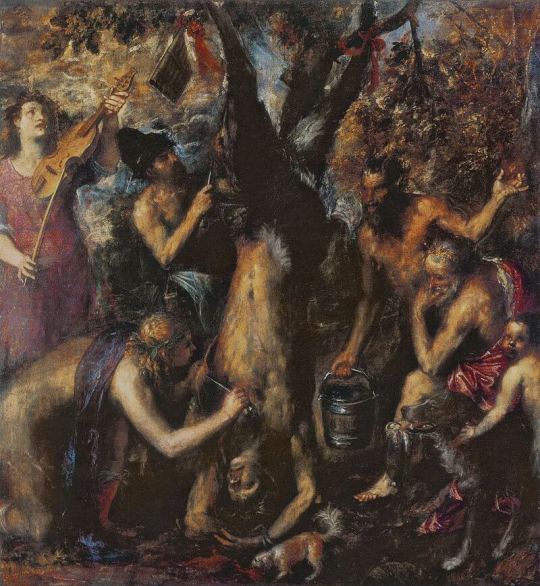
5 notes
·
View notes
Text
Your Permission to Belong: a Deep Yes and a New Verb: To Matronise.
It turns out we are all imposters, or at least most of us feel we are. Although I knew this - it’s why I wrote a blog about it last month - I am still amazed and troubled that it is true. That so many of us feel like we don’t cut it, even in the context of a group like Mothers Who Make (MWM) that aims to be welcoming, inclusive, accessible. It has left me pondering on the opposite of Imposter Syndrome, on what it is that makes you, me, any of us, feel that we belong, that we have a right to be here. Who says? What or who gives us a sense of permission?
Permission -it’s a difficult word, not the obvious go-to one when on a quest for a sense of belonging. I associate it most immediately with stern, finger-wagging teachers, or ‘keep off the grass’ notices- with authority figures and forces that have the power to deny access. In its origins (Latin, permitere) it means to allow through, to let pass, which is why I think it is the key to our sense of belonging. Before we can belong, there is always a threshold moment, a point at which we are allowed to pass. Imposter Syndrome comes about when you feel you sneaked across the border - you are wandering about without a permit and it is only a matter of time before someone finds you out. No one gave you permission.
This is a top down model. The supplicant asks, waits anxiously to see if permission will be granted or denied by the authorities. It is a hugely powerful model. I still remember the first time I managed to get funding, the money was a minimal sum but far more significant was the feeling that someone had chosen me, had granted me permission to make a piece of work. Given how small the grant was, why couldn’t I have made it anyway?! Because I wanted an external authority to tell me I could. I wanted to be patron-ised.
Whilst, in theory, being a feminist and all, I didn’t agree with the patriarchal structure of this system, I was hopelessly hooked into it. I was a good girl, or desperate to be so, to acquire paternal approval to affirm my right to be or do anything. It has taken me becoming a mother to feel, viscerally, how problematic this top-down model of permission-giving can be.
As someone who had long identified as the supplicant, it was rather a shock, when I became a parent, to find myself in the position of authority- the one to dish out or withhold the permissions, in a hundred small ways, many times a day and I have found it exhausting. Perhaps because of this, I fear I am a permissive parent- I often allow my children to do what they want. Irrespective of what parenting methods you believe in, I think it is significant that being ‘permissive' has negative connotations. To say yes too often is a no-no. When I do say no, I have been struck, as my children grow, by the force of their reactions. They rage at first – which is hard - but then they walk away, which is harder. My daughter goes into a corner. My son has been known to make it out the door and down the lane. Both have told me I am the worst mother in the world and that they are in the wrong family - they don’t belong (their shared sense of melodrama is evidence to the contrary, but I refrain from putting this to them in the moment). My daughter is particularly sensitive to any of her wishes, ideas, words not being given full approval. Her back rounds, her head bows, the tears start. Sometimes this happens, not when I have frowned at her, but when I have condoned her brother. She is convinced that it is impossible for me to love her if I also love him. In other words, if she is to belong, she feels someone else must be left out- her inclusion only counts if he has been excluded. Needless to say, I find this very distressing. This is not what I want for her or her brother. And this is not what I want for MWM. I do not want to lead a movement that makes people feel left out, or as if they are imposters, one that furthers the dominant narrative around belonging- that some are allowed in, while others aren’t. What to do?
I remember back to a project I ran before Mothers Who Make called Permission Improbable, a play on the macho action spy movies, Mission: Impossible. The project, which I lead through Improbable, had the modest ambition of changing the world by supporting more women and non-binary people to improvise. Improvising, at its heart, is a game of permission-giving. In the absence of a writer or director - the usual authority figures - you have to practice giving your permission, saying yes, to the other players, the audience, to yourself- your impulses, feelings, thoughts. You never say no. It is not that every patch of grass in an impro scene can be trampled on, but rather that if someone puts up a ‘Do Not Walk Here’ sign everyone on stage says ‘yes’ to it, to the idea of it being part of the story. How ever many lawns are out of bounds, there is a deeper yes always at work- a common ground beneath the turf.
This presents a different model of permission-giving, not top-down, but reciprocal, and unconditional. We say yes to each other, and we say it together, without deliberation. Saying this deep yes to our ideas and impulses is not easy. We have been schooled to look outside ourselves, and upwards, for permission, and we have been trained to say ‘no’- sometimes with good reason. Sometimes ‘no’ keeps us alive. However too many ‘no’s may keep us less alive than we might be. It takes practice to say ‘yes’ but it is worth practicing. Arguably it is THE practice - the only thing you ever really have to practice, as a maker, as a mother- saying a deep “Yes.”
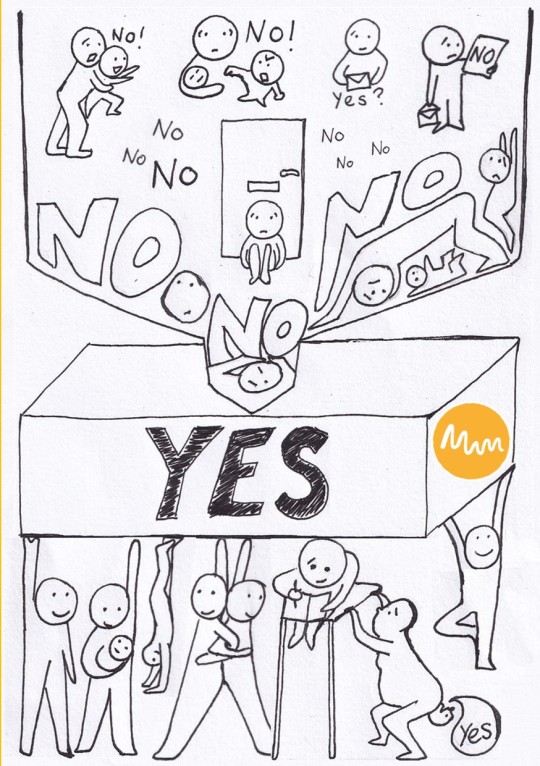
Image by Zoe Gardner @limberdoodle
I remember there was a time as a teenager when I ruthlessly dismissed my mother’s opinion of anything I did. She was my mum, massively biased - she’d always think what I had made was good so her positive feedback didn’t count. Retrospectively I disagree with my teenage self - I believe my mother’s validation of me counted hugely. I think it always counts. There is a place for discernment, but not at the expense of the first, fundamental practice, the ‘yes’ that gets us over the threshold.
When framed in this way, I actually think I need to be more permissive with my children. I need to practice, every day, saying a deep ‘yes’ to them, even or especially in the moments I am not allowing them to do something. As their mother I am their initial threshold, my body was the border they crossed into life. It is my task to say ‘yes’ to them. Yes, you are allowed to be here. Yes, you belong. I realise the children, in their own way, always say this kind of deep ‘Yes’ back to me, even when they are telling me I am the worst mother in the world. I believe that if I can engage in this reciprocal, unconditional model of permission-giving, it can result in a form of belonging that is not ‘in’ or ‘out’, inclusion/ exclusion - not another binary, but an ongoing dynamic process called community. And that is how I want to run Mothers Who Make, and in particular how I want to run our ‘Matronage’ membership scheme.
Let me do a brief re-cap on the Matronage story for anyone who doesn’t know it. In 2019, after a year of writing funding applications for MWM to councils, trusts (the UK patrons of the arts) and receiving no money - money being the major way in which permission is granted or denied in our culture - I was tired. I wanted to find a way to sustain the movement that was in line with the movement, that supported women/ non-binary carers to support themselves and one another, so I launched the Matronage scheme - if we could reach 300 Matron Saints, paying £1 to 10 per month, we could just about keep going. So far, a year on, we have 150.
My vision for Matronage is to see if it is possible to run a membership scheme powered entirely by the impulse to include, not by patronising ‘exclusive, members-only offers.’ I want to build a scheme that is accessible to anyone, no matter their financial status. There are benefits for signing up as a MWM Matron, but the primary, underlying one is that in doing so you are performing a radical act of permission-giving. It is a way to say a deep, resounding YES, to yourself and to others who care about creating and create whilst caring. Yes, you have a right to be here, Yes, your caring matters, Yes, your making matters too. And, yes, if you are reading this, you belong, no matter what your gender identity is, what your making practice is or isn’t, no matter whether you have children or not. Because, whilst it is important to practice saying ‘yes’ to yourself and your ideas, I do not think it is possible to do it all alone. We do need permission from outside ourselves, but we can give it to each other. Even if, like me, you do not identify as being someone important enough to hand out a permit, actually you are- I see it every time I run a MWM meeting or Mother Den. We can allow each other to pass through to a place of belonging, and it is a practice - we must do it over and over again. Let’s call this process ‘being matronised.’
To become a Matron Saint, you can pay anything from £1 per month to £10 per month - you choose. Most people pay £3, but if you can afford it £5 or £10 is brilliant. If you can’t £1 is fine. And if you cannot afford any monetary contribution then you can get in touch and we can playfully, joyfully, shamelessly, work out another kind of offering that you can make. Money is the fastest, and ironically often the cheapest way of saying ‘yes!’ but there are many others.
For now, when you become a Matron Saint you can:
-Attend as many International MWM peer support meetings as you like.*
-Attend as many Mother Dens as you like.*
-Attend any of the MWM Specials.*
-Write a Matron Saint interview, published online, celebrating you and your caring and creating.
-Apply to our Mother Pot commissioning fund once we reach 300 Matron Saints (when this happens a month of our Matronage will go back out to the matrons).
-Take part in our peer-mentoring scheme when I manage to launch it (watch this space!)
-Last but not least, you will give yourself and others permission. Permission to step over whichever thresholds you are teetering on. Permission to belong. And here is a new idea to make this tangible: when you become a Matron I would like to post you a ‘book of permissions,’ a living document to which you can add and which you will pass on to the next Matron, and so and so forth - a way to matronise one another. Such a list reminds me of what is apparently the nation’s favourite poem - Warning- the one in which the poet (Jenny Joseph) lists the outrageous things she will permit herself to do when she grows old - wear purple, pick flowers in other peoples’ gardens, learn to spit. I want to read your equivalent lists for now - let’s not wait till we grow any older.
Here, then, are your questions for the month, and I hope you will feel able to sign up as a Matron, invite others to do so (all genders welcome, non-mothers too), and write your answers in the new MWM book:
What do you need in order to feel you belong? What permission are you waiting for? Can you give it to yourself? Can you give it to others? Can you say a resounding ‘Yes’ to whatever it is you want to create in this world?
To become a matron go here:
https://www.nowdonate.com/checkout/td65v9xn404udt23p91c
To sign up as a matron and offer something other than money email me: [email protected]
*These particular matronly offers are, unless otherwise stated, open to women and non-binary folk only.
2 notes
·
View notes
Text
Who Criminals Pray To
Third competition win.
"Won't you stop shaking that fucking leg of yours?" Mike mutters behind ground teeth. "I'll cut it off if it bothers you that much."
"Look at that bunch of street punks," I whisper back without trying to bring my leg under control. "Just look at them, so little respect, no gravity."
"It's your damn job to groom the newbies Sean."
"I didn't make the timetable. Go figure why the boss felt like we should introduce them to the God this session. Certainly wasn't my idea."
"Can't blame the runts for being excited though. What kind of crazy rotten luck is it to be here same as the Dons of all people?"
"Want me to call them off?"
Mike chews on his lips, purple and split from a bout in whatever hovel he decided to cool his temper in this weekend. Being second in command in the Phobos family isn't exactly a relaxing job. Mike likes to go out with the grunts, rough up some locals late on payments or little dealers trying to cut corners. I find my own releases elsewhere.
"Nah. Good test of character, this."
I'm not so sure. I look up at our five new recruits, mingling with four counterparts of the Don family, jabbing fingers in puffed up chests and engaging in sharp banter.
I assume many first met in the streets. All our new boys were urchins not even a year ago. I read their small, single-paged files, hastily written by the people in charge of them throughout our organisation. I talked to them, tried to educate them as much as I could, grinding rituals in their skulls. At the end of the day I don't think they really understand what we're doing here.
After all, urchins have no God.
Raised around the ovens of a small bakery, I was brought up pious. If object have spirits, places guardian gods, concepts emanations and trades patron saints, it only makes sense to know how to mind your manners and deal with the deities that rule your life.
My mother taught me to keep household spirits happy before I could walk, and my father saved our nicest breads and pastries as offerings. He brought me with him whenever he went for donations. The God of bakers loved us like we loved him, and our dough rose high, our pastries stayed crisp and I never saw a mouse in the shop. When I went to school, I paid monthly tributes to the God of students and emanation of knowledge and curiosity.
So when I became a gang member and joined the Phobos family, I paid just as scrupulous respects to the God of criminals. I understand the concept in a manner our former-urchins-turned-street-thugs can't. To them the God is a boss on top of the boss, too high up the hierarchy to care about them. But they're criminals now, and their success in that new line of business will depend on proper devotion.
"What is the boss doing?" I ask Mike for the tenth time this evening, not trying to hide the worry in my voice.
"Can't be long. The Dons are waiting too, see. Maybe Phobos is busy cutting that fat fuck's fingers right outside?"
Mike smiles lopsidedly at the images that conjures, but it's unlikely. You don't misbehave like that around your God's place. You're not late either. It goes without saying that you don't get in arguments or fist-fights in the ante-chamber, which I'm starting to worry our boys might have forgotten.
I look up across the small waiting room to where another collection of rickety chairs hold equally anxious higher-ups from the Don family, also waiting on their boss so that the ceremony of Gift-giving and Induction can begin.
There is Franky, the Don's son and right arm, and Tilda, a cold-eyed woman you really don't want to meet on the other side of a negotiation table. The man glancing back at me over his glasses is Charles Morrow, a fine fellow with a blade of a face who holds a similar position to mine in his own gang. He raises his eyebrows in silent acknowledgement.
I close my eyes and sigh. Let's hope the God is in a forgiving mood.
A bang and a yelp snap me back to attention. Phobos slammed the door into the men and is storming through, a package under his arm and a puffing, angry red Erzo Don on his heels, still biting on the last words of whatever argument they were having.
Each group folds over their boss and everyone pays last minute attention to the gifts they brought and the fine clothes they wear.
Phobos is a tall man, sharp and well cut, just like the black suits he favours, and known as the coldest mobster on this coast. He exchanges quiet words with Mike, and pats my elbow briefly. The man's way of making up for the stress he knows he's been giving me.
Activity dies down as a servant enters the room to unlock the inner chamber's doors. We shuffle to our positions by hierarchical order and I glance at my charges one last time.
"Remember, don't react, keep it all in!"
They nod, worry finally settling on their young faces as the solemnity of the event dawns on them.
For such a bunch of misfits, they do me proud. All I can hear is sharp intakes of breath as their eyes fall on the deity who will soon learn their name and hold their fates in its heart.
The God of transgression, patron saints of criminals and emanation of rule-breaking, looks like a child and a monster.
Five years old if you had to put an age on it, with sandy blond hair parting around little horns that poke from its forehead and the crown of its head. Some are black and keratinous, some the off-white of ivory. Its skin is unhealthily pale, cheeks oddly flushed. Its pinched, lipless mouth betrays no feelings.
But the real unease comes from the eyes. One dark and filled with odd lights, the other white and full of colourful swirls, both huge and sparkling, somehow. Alien.
The child-like being sits on a large pillow atop a carpeted dais, its servants kneeling behind it. Like the building, they are paid for by donations, one of the many ways we show our love to the God.
"Greetings!" Don booms, stepping up to deliver his offering. "I present you with these gifts, my dea–"
Don's words die in his throat, silenced by a small hand, raised palm out.
"Erzo Don, what do you think you are doing here?"
The God's voice is high as a child's but its inflections are nuanced, its tone menacing.
"Well... We've come to presen–"
"You annoy me."
The pressure rises in the room and I feel goosebumps all over my skin. The God stands, face as blank as marble.
"I am the God of criminals, Don. I patron thieves, liars, racketeers, yes. People who live on the margins of the larger society. But if there is one thing I don't condone, it is lying to me."
The God steps down towards Don. I see the sweat drenching him, Morrow's bloodless face, Tilda's hand all white-knuckled around Frank's wrist and their new men's confused expressions. What have they done?
"You can't go and grovel to the God of killers and murderers thinking I wouldn't know about it. Did you not think of your family? Of me?"
"God, but it was only a sid–"
"Go."
Silence hangs over us like a corpse at the end of a fraying rope. There is nothing to do but to obey. One word that ends a whole family business, maybe a fifth of the local territory, suddenly up for dispute. Chaos will engulf them, they will have no divine support.
I'm still thinking of the consequences as the door closes behind the last of them and Phobos steps up, offering the content of his package like nothing happened. It's two hands sawed at the wrists and held together by handcuffs. Charming–and it makes the God smile. Mike is next, showing his split lips and telling his tales. The God nods along, used to the urban-outlaw-cowboy style of our second-in-command. And then it's me, embracing the being my success in life depends on. He's done me good and I love it like I loved the pudgy God that ate our bread and blessed us for it.
"What have you for me Sean?" The child-God asks as I cup its pallid face in my scarred hands.
"A secret," I murmur in its ear. "The cops are coming to crack on the riverside locations. I tipped them to great profit."
The God chuckles, looking up at me with the same adoration I feel for it. It squeezes my hand and waves for me to introduce our new members.
What's a spy to the emanation of rule breaking? Nothing more than a good devotee.
~~ June 2017 – Theme : Gangsters and Crime Lords
1 note
·
View note
Text
Saints&Reading: Wed., Apr.22, 2020
Saint Theodore Sykeole Bishop of Anastasiopolis

Saint Theodore the Sykeote was born in the mid-sixth century in the village of Sykeon, not far from the city of Anastasiopolis (in Galatia, Asia Minor), into a pious family. When his mother Maria conceived the saint, she had a vision of a bright star overshadowing her womb. A clairvoyant Elder, whom she consulted, explained that this was the grace of God being poured forth on the infant in her womb.
When the boy reached the age of six, his mother presented him with a golden belt, since she intended that her son should become a soldier. That night the Holy Great Martyr George (April 23) appeared to her in a dream, and he told her not to consider military service for her son, because the boy was destined to serve God. The saint’s father, Cosmas, had served as a messenger of the emperor Justinian the Great (527-565), and he died at an early age. The boy remained in the care of his mother, and his grandmother Elpis, his aunt Dispenia and his little sister Vlatta also lived with them.
In school, Saint Theodore displayed great apptitude in his studies, chief of which was an uncommon ability for reasoning and wisdom. He was quiet, mild, he always knew how to calm his comrades, and he did not permit fights or quarrels among them.
The pious Elder Stephen also lived at his mother’s house. Imitating him, Saint Theodore at the age of eight began to eat only a small morsel of bread in the evening during Great Lent. So that his mother should not force him to take supper with everyone, the boy returned home from school only toward evening, after he had partaken of the Holy Mysteries with Elder Stephen. At the request of his mother, the teacher began to send him home to supper at the end of his lessons. Saint Theodore, however, ran to the church of the Great Martyr George, where the saint appeared to him in the form of a youth, and ushered him into the church...keep reading OCA
Venerable Vitali of Gaza
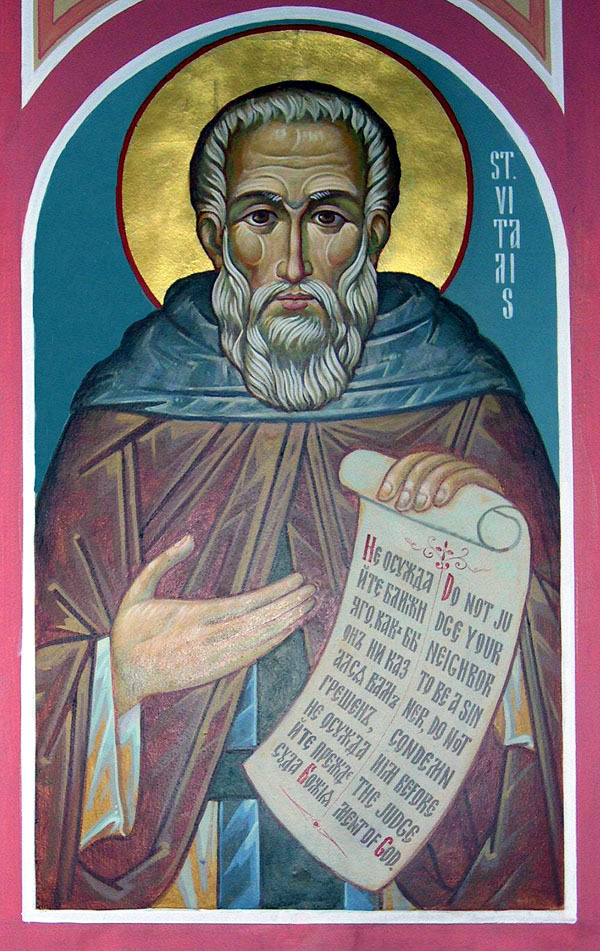
Saint Vitalis of Gaza (died c. 625 AD) is a hermit venerated as a saint in the Orthodox Church and the Catholic Church. He is the patron saint of prostitutes and day-laborers.
A monk of Gaza, he travelled to the city of Alexandria at the age of sixty. His legend states that after obtaining the name and address of every prostitute in the city, he hired himself out as a day laborer, and took his wage to one of these women at the end of the day. He then would teach her about her dignity and value as a woman and that she did not deserve to be used by men as an object of their lust.
This practice was condoned by the Church, and many prostitutes in the city abandoned their profession and became good wives and mothers.
Death and veneration
Vitalis was killed when a man, misunderstanding the nature of the monk's visit to a brothel, struck him on the head. Vitalis managed to return to his hut where he died. Apparently during his burial, former prostitutes came out to explain his works before processing with candles and lanterns as his body was brought to the grave.[1]
In the Eastern calendar, his feast day occurs on January 11 and April 22, while the Catholic Church only celebrates his feast on January 11.
Source Wikipedia
Acts 2:22-36 NKJV
22 “Men of Israel, hear these words: Jesus of Nazareth, a Man attested by God to you by miracles, wonders, and signs which God did through Him in your midst, as you yourselves also know— 23 Him, being delivered by the determined purpose and foreknowledge of God, you [a]have taken by lawless hands, have crucified, and put to death; 24 whom God raised up, having [b]loosed the [c]pains of death, because it was not possible that He should be held by it. 25 For David says concerning Him:
‘I foresaw the Lord always before my face,
For He is at my right hand, that I may not be shaken.
26 Therefore my heart rejoiced, and my tongue was glad;
Moreover my flesh also will rest in hope.
27 For You will not leave my soul in Hades,
Nor will You allow Your Holy One to see corruption.
28 You have made known to me the ways of life;
You will make me full of joy in Your presence.’
29 “Men and brethren, let me speak freely to you of the patriarch David, that he is both dead and buried, and his tomb is with us to this day. 30 Therefore, being a prophet, and knowing that God had sworn with an oath to him that of the fruit of his body, [d]according to the flesh, He would raise up the Christ to sit on his throne, 31 he, foreseeing this, spoke concerning the resurrection of the Christ, that His soul was not left in Hades, nor did His flesh see corruption. 32 This Jesus God has raised up, of which we are all witnesses. 33 Therefore being exalted [e]to the right hand of God, and having received from the Father the promise of the Holy Spirit, He poured out this which you now see and hear.
34 “For David did not ascend into the heavens, but he says himself:
‘The Lord said to my Lord,
“Sit at My right hand,
35 Till I make Your enemies Your footstool.” ’
36 “Therefore let all the house of Israel know assuredly that God has made this Jesus, whom you crucified, both Lord and Christ.”
Footnotes:
Acts 2:23 NU omits have taken
Acts 2:24 destroyed or abolished
Acts 2:24 Lit. birth pangs
Acts 2:30 NU He would seat one on his throne,
Acts 2:33 Possibly by
John 1:35-51 NKJV
The First Disciples
35 Again, the next day, John stood with two of his disciples. 36 And looking at Jesus as He walked, he said, “Behold the Lamb of God!”
37 The two disciples heard him speak, and they followed Jesus. 38 Then Jesus turned, and seeing them following, said to them, “What do you seek?”
They said to Him, “Rabbi” (which is to say, when translated, Teacher), “where are You staying?”
39 He said to them, “Come and see.” They came and saw where He was staying, and remained with Him that day (now it was about the tenth hour).
40 One of the two who heard John speak, and followed Him, was Andrew, Simon Peter’s brother. 41 He first found his own brother Simon, and said to him, “We have found the [a]Messiah” (which is translated, the Christ). 42 And he brought him to Jesus.
Now when Jesus looked at him, He said, “You are Simon the son of [b]Jonah. You shall be called Cephas” (which is translated, [c]A Stone).
Philip and Nathanael
43 The following day Jesus wanted to go to Galilee, and He found Philip and said to him, “Follow Me.” 44 Now Philip was from Bethsaida, the city of Andrew and Peter. 45 Philip found Nathanael and said to him, “We have found Him of whom Moses in the law, and also the prophets, wrote��Jesus of Nazareth, the son of Joseph.”
46 And Nathanael said to him, “Can anything good come out of Nazareth?”
Philip said to him, “Come and see.”
47 Jesus saw Nathanael coming toward Him, and said of him, “Behold, an Israelite indeed, in whom is no deceit!”
48 Nathanael said to Him, “How do You know me?”
Jesus answered and said to him, “Before Philip called you, when you were under the fig tree, I saw you.”
49 Nathanael answered and said to Him, “Rabbi, You are the Son of God! You are the King of Israel!”
50 Jesus answered and said to him, “Because I said to you, ‘I saw you under the fig tree,’ do you believe? You will see greater things than these.” 51 And He said to him, “Most assuredly, I say to you, hereafter[d] you shall see heaven open, and the angels of God ascending and descending upon the Son of Man.”
Footnotes:
John 1:41 Lit. Anointed One
John 1:42 NU John
John 1:42 Gr. Petros, usually translated Peter
John 1:51 NU omits hereafter
New King James Version
(NKJV)
Scripture taken from the New King James Version®. Copyright © 1982 by Thomas Nelson. Used by permission. All rights reserved. Source Biblegateway
#orthodoxy#spirituality#firstchristian#ancientchristianity#gospel#brightweek#christisrisen#mysticalchristianity
2 notes
·
View notes
Text
It makes me so upset how automatic judgement people in privilege have of the poor. Especially in the PH where there’s a lot.
“Why do they keep having babies?! They should make condoms free! Of course they’re in poverty, they keep having babies” Like many third world, developing countries, birth contraceptives are inaccessible. In the Philippines I have *heard* that condoms are expensive. Not only that, but the Philippines is a Catholic country so abortions are illegal and practicing abstinence is their form of health education. My aunt told me she was never taught sex education or how reproduction works, so she was shocked when she had her second child right away (mind you this was 30 years ago, so i’m unsure of what it’s like now). But you can bet people who did not afford a formal education did not get sex education let alone a formal one.
“During this pandemic the poor still choose to drink and sing karaoke! No wonder they’re still poor, they choose drugs and alcohol over buying food” I see this statement as the whole poor people can’t have nice/shouldn’t have nice things because they are poor (alcohol and karaoke). BUT this is also a coping mechanism (karaoke). Like many of us who are coping by drawing/coloring/reading/binge watching netflix, this is also one of the ways they’re coping. By doing their hobby, like karaoke and yes, they are drinking... but a lot of the times when you sing karaoke, there is a form of alcoholic beverage involved (at least when I’ve gone to karaoke). For the drug problem in the Philippines... there have been more deaths by the drug war than COVID-19. And from my understanding and reading (Patron Saints of Nothing by Randy Ribay and other articles) sometimes drugs like cement/shabu are used as an escape from hunger and are often times cheaper than food. Although I do not condone using drugs and personally haven’t tried it, I do empathize and understand at least why some people take it. Be hungry or feel nothing? I’d like to think and see the best in people and believe that if these people had access to food, access to an education, access to a living wage job, that there would not be a result in using hard drugs. It’s so easy to blame the poor for being poor and for making the choices they’ve made, but understanding their why? Their root causes? How their government works and how colonization hurts?
“They’re lazy.” Well if I didn’t get an education, had no form of skill or trade and did not get an opportunity to learn, I could honestly say there’s a 50% chance I would be lazy too.
This is all ideas that have come from my head and what i’ve read so far in books and articles. In no way, shape or form am I saying this is 100% true, because I obviously never lived their lives nor do I completely understand what it’s like living in the Philippines. But as a Fil-Am I did not want to judge and tried my best to educate myself to gain some sort of understanding of what and why some people are the way they are.
Sources on top of my head:
Books i’ve read: My fate according to the butterfly, patron saints of nothing, everlasting nora.
Article: https://medium.com/swlh/poor-starving-and-angry-why-the-right-to-vote-is-still-yours-1a214503888d
1 note
·
View note
Text
Fun fact about Angel NAMES okay so Angelology is a whole thing apparently mainly coming from Apocryphal works and Kabbalistic tradition and i’m pretty sure the suffix -el means “of God” and here we got tons of ‘em with names that all mean “something of God” and they all are Angels of various things like patron saints in a way, most of them have various different duties and functions and whatever but i’ve just put the one that’s probably most relevant so let’s see here
Please note many have more than one possible translation cause this whole Biblical Hebrew translation thing i guess isn’t an exact science
Sachiel, Covering or Price of God, the Angel of Water
Shamshel, Lonely Conqueror of God or Sun of God, the Angel of the Morning
Ramiel, Thunder of God, the Angel of...well, thunder
Gaghiel, Roaring Beast of God, the Angel of Fish
Israfel, interestingly Israfel is the only one from the Quran, and is usually spelled Israfil, Four-winged Angel of Music. The meaning of his name is apparently unknown, although on the EVA wiki they translate it as “The Burning One”, I don’t know where they got that
Sandalphon, Co-Brother, the Angel of the Embryo
Matarael, Premonition of God, the Angel of Rain
Sahaquiel, Ingenuity of God, the Angel of the Sky
Iruel, (spelled Ireul in the series i do not know why) Fear of God, the Angel of Terror
Leliel, Jaws of God, The Angel of the Night
Bardiel, also spelled Barachiel, Kindness of God, The Angel of Hail and Lightning
Zeruel, The Arm of God, The Angel of Strength
Arael, Light or Lion of God, Angel of Birds, Given dominion over the air and winds
Armisael, Mountain of the Judgement of God, Angel of the Womb
Tabris, This one’s really tough, Tabris is...Arabic, according to one person, translating as The Emerged or The Arisen, but that doen’t exactly seem to be true? I’ve seen a lot of possible translations, but none of them seem to be exact. He is usually identified as the Angel of Free Will, apparently that comes from a Greek Occult text that identifies an entity called Tabris as the Genie/Djinn of Free Will and The Sixth Hour. He’s a very strange one.
Oh yeah and Adam just means Earth or Man and is the progenitor of life and Lilith means night-hag and according to the satirical text The Alphabet of Sirach, she was Adam’s first wife before splitting with him over wanting to be on top while they had sex and then fucking Samael (Venom or Blindness of God, an Archangel of death but also a destroyer and condoner of sin who is often conflated with the serpent in the Garden), giving birth to a host of demons called the Lilin, which is of course what mankind is called in the show so isn’t tHAT NEAT probably not idek why i’m making this naww i’m sure it’ll get....at least one solid like
108 notes
·
View notes
Photo
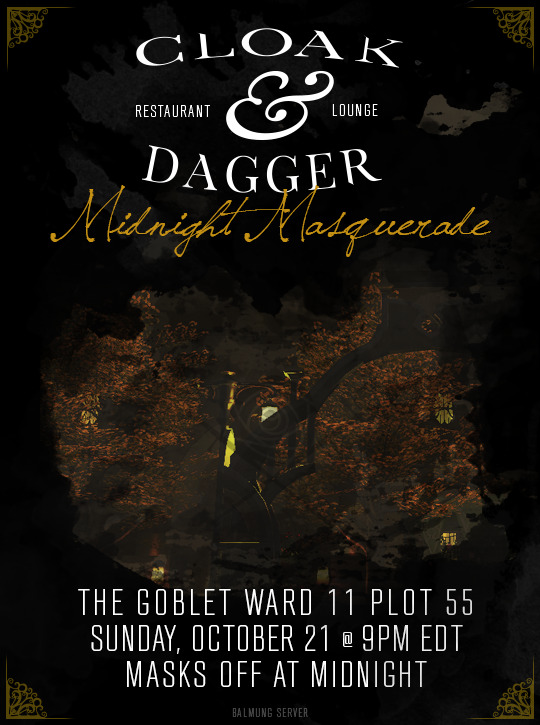
JOIN US FOR A NIGHT OF MASKS AND MISCHIEF.
The Cloak & Dagger cordially invites patrons new and old to the venue on Sunday, October 21 at 9PM EDT to enjoy a masquerade-styled open night in honor of All Saint’s Wake.
As it is designated as neutral ground by its proprietor, the venue will still be open to a less mystical brand of mischief in the form of its usual under-the-table dealings.
⸸ Venue Information, House Rules, and Menu
※ For the masquerade, only drinks will be served by our staff. Additional special cocktails will be added to the menu, and there will be an open buffet set out with small snacks.
⸸ For the convenience of event staff and fellow patrons, if you are attending for criminal RP and/or have ordered a Cloak & Dagger, please set your status to looking for party. This will let us (and others!) find you more easily.
Located at: The Goblet Ward 11 Plot 55
Last call is after masks come off at midnight.
We hope to see you there!
Please note that Ebonguard and associated ventures are not associated and does not condone real-life criminal activities. Activities engaged in or discussed by members of Ebonguard or associated ventures are strictly fictional and for entertainment purposes only.
The Cloak & Dagger is an RP venue affiliated with the Ebonguard criminal network LS, owned IC and OOC by “Crow” (Leonnaux Altoix/@krahenlied). If you’re interested in helping run a monthly public RP event (be it as waitstaff, security, etc) at The Cloak & Dagger then please contact us at @ebonguardls.
No lasting commitment or membership of the LS is required on the part of volunteer staff! For more information, please see this page under the ‘volunteer’ tab.
#ffxiv rp#ffxiv roleplay#balmung rp#balmung rp event#balmung ffxiv#ffxiv balmung#ebonguardls#{ the cloak and dagger. }
83 notes
·
View notes
Text
Josefina’s Real-Life Inspiration
In honor of Josefina’s birthday, I thought I would share my theory that her character was loosely inspired by Josefa Jaramillo:

Josefa was the wife of Kit Carson, and is mentioned in the Welcome to Josefina’s World book:

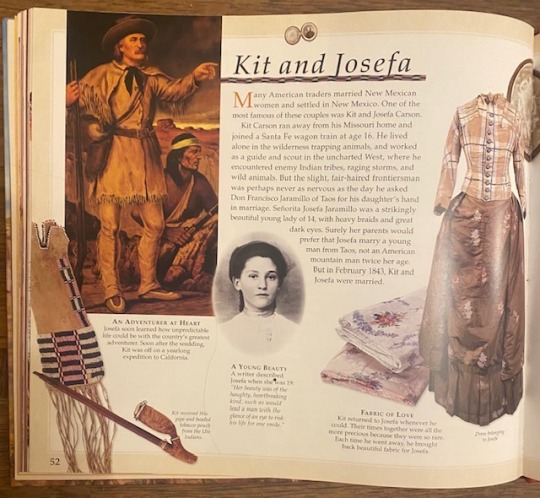
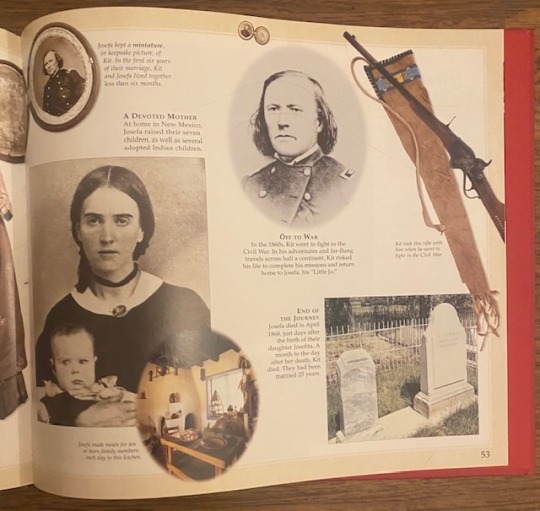
I believe she inspired Josefina’s character because:
Josefa was the fourth and youngest daughter in her family (like Josefina)
Josefa lived in Taos, New Mexico (Josefina lives near Santa Fe, New Mexico)
Josefa was born on March 19, 1828 (Josefina’s birthdate is March 19, 1815)
Her first name was María Josefa
We learn at the end of Josefina Learns A Lesson that Josefina’s full name is María Josefina Montoya.
According to an article on Spanish naming conventions:
Compound First Names (Saints Names)
Complicating the above conventions, is the practice of giving children several first (given) names, usually two or three, which was believed to ensure protection by the greatest number of Saints. Traditionally, one of the names had to be the Saint of the Birthday. Often they were named for the patron saints of various churches in Spain. Usually the second name is abstract, signifying the name of a Madonna, like Esperanza [hope], Concepción [conception], Dolores[pain], Encarnación [incarnation],
Among my ancestors, most women have the name María ~ named for the mother of Christ. Similarly, José (Joseph) is the most common Saint's name for a son ~ named for the father of Christ.
From Happy Birthday, Josefina!:
Tía Dolores was adding numbers in her ledger. After a while, she paused and asked, “Josefina, your birthday is coming soon, isn’t it?”
“Sí,” said Josefina. “I was born on March nineteenth, the feast of San José.”
Josefa, like Josefina, was named after both Mary and Joseph:
All four daughters of the Jaramillos were given the first name of María, a not uncommon practice in pious Catholic families. To distinguish them, they were called by their second given name, which in the case of Kit Carson's bride was Josefa, the feminine form of José, or in English, Joseph. Thus in bearing the names of Mary and Joseph, it is supposed, she could count on the intercession of the Holy Family in times of need.13
The Jaramillos were in the habit of calling their youngest daughter Josefita, a diminutive that served as a term of endearment, but also differentiated her from the deceased Josefa, for whom she had been named. (source)
Josefa even had a nickname that is only one letter off from Josefina!
Unfortunately not much is known about Josefa, but we do have these descriptions:
Willa Cather in her historical novel, Death Comes For The Archbishop, gives a brief description of Josefa Carson. She received visitors at her Taos home, according to Miss Cather, “with that quiet but unabashed hospitality which is a common grace in Mexican households. She was a tall woman, slender, with dropping shoulders and lustrous black eyes and hair. Though she could not read, both her face and conversation were intelligent. … She had a cheerful disposition, too, and a pleasant sense of humor.”1
Although the book is a work of fiction, from what is known of Kit Carson's third wife, this literary depiction of her is fairly accurate. Only in Cather's reference to her height is there some doubt. (source)
And:
A description of Josefa has come down to us from Lewis Garrad, the lively chronicler of the Taos Trail, who met her in 1846: “Her style of beauty was of the haughty, heart-breaking kind – such as would lead a man with the glance of the eye, to risk his life for one smile.” (source)
Finally, I want to add a disclaimer. I have not reccommended any books or articles because the only book that talks about Josefa in detail (which I’ve linked as a source) is written from a colonial perspective. Horrifying things happened, and Kit Carson was hailed as an American hero for his part in colonizing the West. I am NOT in any way condoning that. However, I do find Josefa herself fascinating, and she wasn’t involved in those events.
0 notes
Text
St. Thomas More (1478–1535) was born in London, the son of a lawyer and judge. He was educated in the finest schools and became a brilliant English statesman. He served in parliament, on the King's council, as a diplomat, and in many other prominent positions in public administration. He was highly esteemed for his unfailing moral integrity, sharpness of mind, humor, and extraordinary learning. He was also a faithful Catholic, a loving husband, and a devoted father. For his great abilities he was promoted by his friend King Henry VIII to the high office of Lord Chancellor, second in position to the king. He resigned from this post when the king, in open defiance of Church teaching, sought to divorce his wife in order to marry another woman, and to declare himself sovereign of the Church in England. Thomas More, a defender against heresy, refused to condone the king's actions. After trying unsuccessfully to persuade his friend to approve of what he was doing, King Henry VIII imprisoned More in the Tower of London. At his trial, More testified boldly for Church autonomy over the state, for the authority of the pope as head of the Church, and for the indissolubility of marriage in the eyes of God. He was eventually condemned and beheaded, dying as a martyr for the Catholic faith. Thomas More is the patron saint of statesman, politicians, lawyers, civil servants, and large families. His feast day is June 22nd.

0 notes